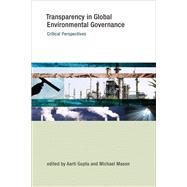Transparency in Global Environmental Governance Critical Perspectives
, by Gupta, Aarti; Mason, Michael- ISBN: 9780262526180 | 0262526182
- Cover: Paperback
- Copyright: 7/11/2014
Transparency—openness, secured through greater availability of information—is increasingly seen as part of the solution to a complex array of economic, political, and ethical problems in an interconnected world. The “transparency turn” in global environmental governance in particular is seen in a range of international agreements, voluntary disclosure initiatives, and public-private partnerships. This is the first book to investigate whether transparency in global environmental governance is in fact a broadly transformative force or plays a more limited, instrumental role.
After three conceptual, context-setting chapters, the book examines ten specific and diverse instances of “governance by disclosure.” These include state-led mandatory disclosure initiatives that rely on such tools as prior informed consent and monitoring, measuring, reporting and verification; and private (or private-public), largely voluntary efforts that include such corporate transparency initiatives as the Carbon Disclosure Project and such certification schemes as the Forest Stewardship Council. The cases, which focus on issue areas including climate change, biodiversity, biotechnology, natural resource exploitation, and chemicals, demonstrate that although transparency is ubiquitous, its effects are limited and often specific to particular contexts. The book explores in what circumstances transparency can offer the possibility of a new emancipatory politics in global environmental governance.







